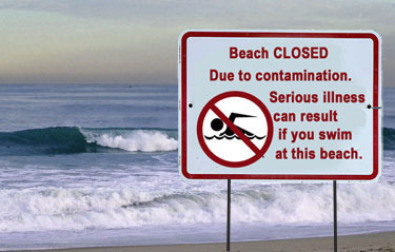Contaminated Beaches While the world focuses on the SARS-CoV-2 virus and the disease it causes, COVID-19, people are learning about viruses and why they make us sick. But many people might not be aware that planet Earth is full of viruses and bacteria, collectively referred to as microorganisms. We often think that all bacteria and viruses make us sick, but it turns out that's not the case. While some microorganisms do make us sick, the vast majority can't even infect us and, instead, they play a critical role in our ecosystems. These microorganisms have been around since the very beginning of life on Earth. While the world focuses on the SARS-CoV-2 virus and the disease it causes, COVID-19, people are learning about viruses and why they make us sick. But many people might not be aware that planet Earth is full of viruses and bacteria, collectively referred to as microorganisms. We often think that all bacteria and viruses make us sick, but it turns out that's not the case. While some microorganisms do make us sick, the vast majority can't even infect us and, instead, they play a critical role in our ecosystems. These microorganisms have been around since the very beginning of life on Earth.That being said, we naturally worry about the ones that do infect us, and, as we have learned recently, it is very easy to pass a virus from one person to another, especially if they are on surfaces that we often come in contact with, like a doorknob. However, viruses and bacteria can also be found in places where we recreate, like at the beach. That's right. Scientific research by biologists has shown that we come in contact with infectious microorganisms when we enter the ocean at the beach. How does that happen? Well, it has a lot to do with our current spring showers. Unfortunately, our modern lifestyle and practices have led to our coastal waters becoming contaminated with disease-causing microorganisms as well as chemical waste, including antibiotics and other drugs. These antibiotics can lead to resistant strains of bacteria that can turn into so-called superbugs. During most of the year when it's dry, human and animal wastes as well as chemicals accumulate in dry river beds. When it rains near the coast in a place like California, a lot of waste and debris from the dry inland regions get washed down and out into the channels that lead to the ocean. During heavy rain spells, those dry beds get deluged and all of the accumulated wastes get washed away towards the oceans where they concentrate in the surfline. Local health officials will monitor the coastal water and check to make sure the levels of bacteria are not too high. If they are, then they will post beach closure signs warning people from entering the water. They typically remove the warnings 72 hours after the last rainfall when the number of contaminating bacteria decreases. Sometimes many people, like surfers, will ignore the warnings and enter the water immediately after a rain so that they can enjoy the high surf; but it is considered dangerous to one's health to do so and it is strongly recommended to wait 72 hours after a rainfall before venturing back into the water. As a society, we should try to make sure that our coastal waters do not become contaminated with human and animal waste or with chemicals and drugs. By keeping our beaches and coastal waters clean, we can safely play in the water and remain healthy. But until we find a way to completely prevent our coasts from becoming contaminated, we should remember the 72-hour rule - stay away from the beaches and don't enter the ocean for 72 hours after a rainfall. You can learn more from the Environmental Protection Agency (EPA) by reading their Before You Go To The Beach brochure. |
